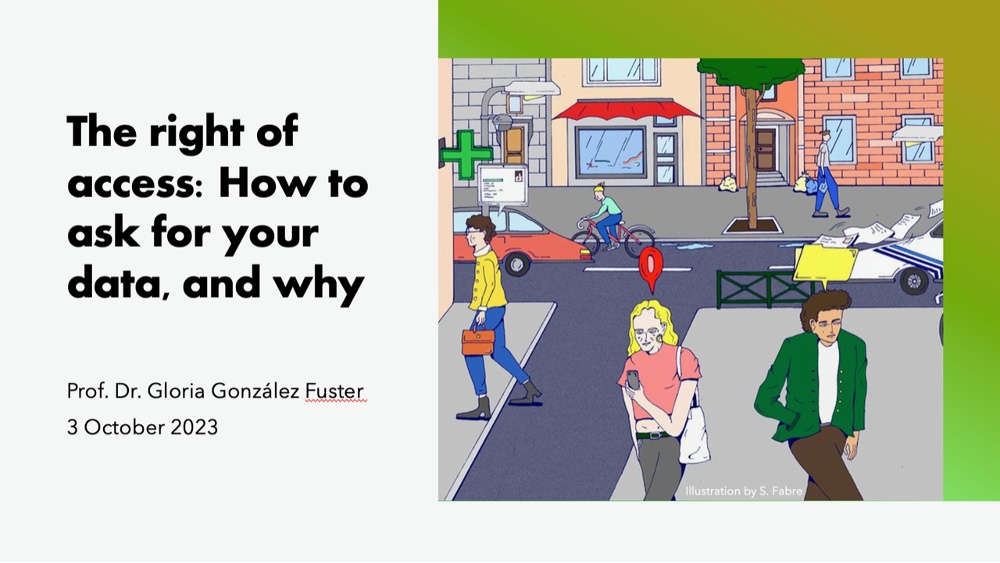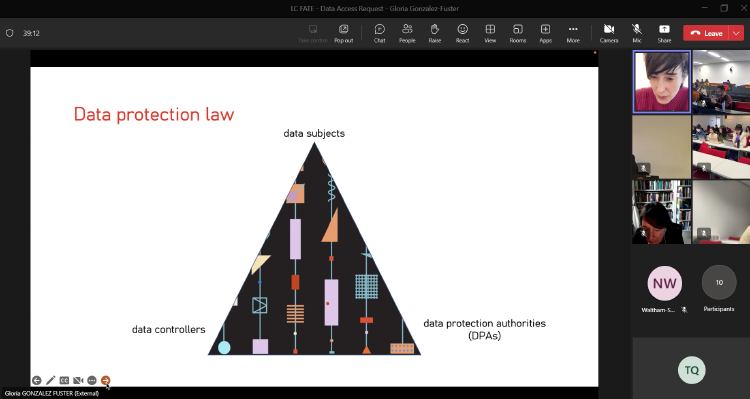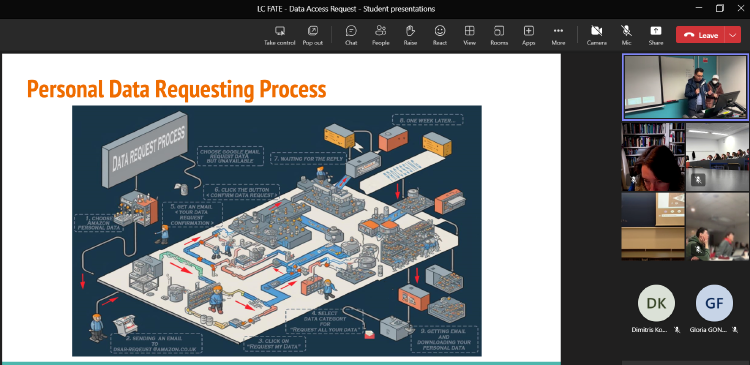You are here :
FATE: Fairness, Accountability And Transparency In Data Processing
The Community is based on courses from Universitat Pompeu Fabra (UPF), Vrije Universiteit Brussel (VUB), University of Warwick (WU) and CY Cergy-Paris (CY). These courses are interdisciplinary and include elements from computer science, law, and social sciences. The aim of this LC is to approach key issues related to the fairness, accountability, transparency, and ethics of digital technologies and their social dimensions.
The Community is partially based on existing courses where the participating professors are involved, as follows:
- At Universitat Pompeu Fabra, a course named FATE on personal data processing, data-driven decision support, and automated decision-making.
- At Vrije Universiteit Brussel, a course on Privacy and Data Protection Law at the Faculty of Law & Criminology. It includes activities such as learning by sharing experiences on submitting and following up data access requests.
- At University of Warwick, the course on Data Visualisation in Science, Culture and Public Policy at the Centre for Interdisciplinary Methodologies.
- At CY Cergy Paris University, the course on "Transparency and Fairness in Big Data and AI Algorithms" on the Research Master of Research in Computer Science and the course "Data Protection and New Digital Tools" from MA Political Ideas in a Digital Age.
The Community is currently focused on understanding the use of Data Subject Access Requests (DSARs) as an educational tool. A DSAR is a request initiated by an individual and addressed to an organization that exercises the right of that individual to receive a copy of the personal data processed about them by that organization.
Learning Community Activities
- Past Events
-
-
2023
On 6 November 2023, students of "Data Protection and New Digital Tools" (at CY Cergy Paris University) of Prof. Dimitrios Kotzinos will present the findings of their work on the right of access to the students following VUB’s classes on “Privacy and data protection law” with Prof. Gloria González Fuster (VUB).
The 2023-2024 academic year kicked off with parallel activities at Vrije Universiteit Brussel (VUB) and CY Cergy Paris University. On 3 October 2023, Prof. Gloria González Fuster (VUB) delivered a lecture on “The right of access: How to ask for your data, and why” to Prof. Dimitrios Kotzinos’ students of "Data Protection and New Digital Tools" from MA Political Ideas in a Digital Age at CY Cergy Paris University.The right of access: How to ask for your data, and why
For 2023, the FATE LC is planned to conduct a second iteration of this exercise, this time involving students from UPF and WU. Similarly, the activity will start with a presentation from Prof. Gloria González Fuster (VUB) to the students of Prof. Noortje Marres (at UW) and Prof. Carlos Castillo (at UPF) planned for February 8th, 2023.The presentation of completed projects and progress reports is planned for March 15th, 2023. Additionally, a presentation of the final results from the students at VUB that participated in the activity starting in 2022, is planned to take place later in 2023.
Artwork made by Jiayi Wang (Postgraduate student, Centre for Interdisciplinary Methodologies, University of Warwick, 2023)Following cross-campus exchanges, the VUB team created a podcast reflecting on the lessons learned.
The interdisciplinary approach allowed students to think about howreconcile different rights and interests, as well as different disciplinary perspectives.
-
2022:
The kick-off meeting of the LC took place on June 7th, 2022, as an in-person meeting of the professors involved at CY.
In the first semester of 2022, the FATE LC piloted a joint activity involving students from CY and VUB. At VUB, a group of students started working on the legal issues around the use of personal data access requests as an educational tool. Taking as a starting point the concrete interest of the learning community in study data processing practices through data access requests, and working as a team, they were assigned the task of identifying the main legal challenges of organising coordinated access request in the context of education.
At CY, students self-organized in groups and each participant was given the same initial task: to perform a DSAR and to document the process of receiving a response. Then, group members were asked to jointly reflect and discuss both about the process of receiving an answer to the DSAR, as well as the contents of the received data.
This activity started on October 11th, 2022, with a presentation from Prof. Gloria González Fuster (VUB) to the students of Prof. Dimitrios Kotzinos (CY). A second gathering took place on November 29th, 2022, where students at CY presented their results and students at VUB presented a progress report.
Students' presentations highlighted numerous learnings that they obtained from this exercise, including increased awareness of the types of data being captured and stored by the services they use every day, and increased awareness of both the rights of data subject, as well as of the remaining obstacles towards effectively exercising those rights.
-
How to get involved?
(Students and educators)
Contact the EUTOPIA curriculum team: Jo Angouri (J.Angouri@warwick.ac.uk) and Karen Triquet (karen.triquet@vub.be).
Learning Community Members
- Lead: Carlos Castillo (UPF). Email: carlos.castillo@upf.edu
-
Carlos Castillo (he/him) is an ICREA Research Professor at Universitat Pompeu Fabra in Barcelona, where he leads the Web Science and Social Computing research group. He is a web miner with a background in information retrieval and has been influential in the areas of crisis informatics, web content quality and credibility, and adversarial web search. He is a prolific, highly cited researcher who has co-authored over 100 publications in top-tier international conferences and journals, receiving two test-of-time awards, five best paper awards, and two best student paper awards. His works include a book on Big Crisis Data, as well as monographs on Information and Influence Propagation, and Adversarial Web Search.
- Partner: Gloria González Fuster (VUB). Email: Gloria.Gonzalez.Fuster@vub.be
-
Prof. Dr. Gloria González Fuster is a Research Professor at the Vrije Universiteit Brussel (VUB)’s Faculty of Law and Criminology, and Co-Director of the Law, Science, Technology and Society (LSTS) Research Group. She holds a BOF research position on the theme ‘Digitalisation & a Europe of rights and freedoms’ (since October 2021), teaches ‘Privacy and data protection law‘, and coordinates the course ‘Bruxelles: La ville et le droit’. Additionally, she lectures on data protection law at the LL.M. in European and Transnational Law of Intellectual Property and Information Technology of Georg-August-Universität Göttingen.
She is currently contributing to the projects Articulating Law, Technology, Ethics and Politics: Issues of Enforcement and Jurisdiction of EU Data Protection Law under and beyond the General Data Protection Regulation (ALTEP-DP) (SRP project), Autonomy through Cyberjustice Technologies (ACT), and ‘La implementación del RGPD en España: El impacto de las cláusulas abiertas en la nueva LOPD, en su normativa de desarrollo y en la legislación sectorial’ (PRODATIES) (RTI2018-095367-B-I00), as well as the Legality Attentive Data Scientists (LEADS) MSCA Innovative Training Network.
González Fuster is member of the Content Committee of the Privacy Camp. She is also a member of the Steering Committee of the Data Protection Law Scholars Network (DPSN), of RHEA (VUB’s research centre on Gender, Diversity and Intersectionality) and the Brussels Centre for Urban Studies (BCUS), and member of the Brussels Privacy Hub (BPH), in addition to being a member of the Advisory Board of the Privacy Salon and of the dpialab, as well as member of the Steering Committee of the Cyber & Data Security Lab (CDSL).
She is Associate Editor at the European Data Protection Law Review (EDPL), Lexxion, and Member of the Board of Editors of the Information, Technology and Law Series, Asser Press, Springer.
She is also a member of the European Commission’s Multistakeholder Expert Group to support the application of the General Data Protection Regulation (GDPR), designated as academic expert.
More information: https://glgonzalezfuster.blog/,
Twitter: @FusterGloria - Partner: Noortje Marres (UW). Email: N.Marres@warwick.ac.uk
-
Noortje Marres is Professor in the Centre for Interdisciplinary Methodologies (CIM) at the University of Warwick (UK). She studied Sociology and Philosophy of Science and Technology at the University of Amsterdam and has published two monographs: Material participation (2012) and Digital Sociology (2017). She is the UK PI for the ESRC-funded international project Shaping AI: Controversy and Closure in Research, Policy and Media and a visiting professor in the Centre for Media of Cooperation at the University of Siegen. More info at http://noortjemarres.net/
- Partner: Dimitris Kotzinos (CY). Email: dimitrios.kotzinos@cyu.fr
-
Dimitris Kotzinos is a Professor at the Department of Computer Science of the CY Cergy Paris University, member of the ETIS Lab and member of the MIDI team of the lab. His main research interests include data management algorithms, techniques and tools; development of methodologies, algorithms and tools for web-based information systems, portals and web services; and the understanding of the meaning (semantics) of interoperable data and services on the web. Recently he has started working on studying the formation and evolution of discussions in online social networks using Machine Learning (ML) and Artificial Intelligence (AI) techniques. Additionally, he has started working in the area of accountability, explainability and fairness of the ML and AI algorithms, especially when applied in data engineering and analysis problems.





